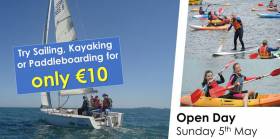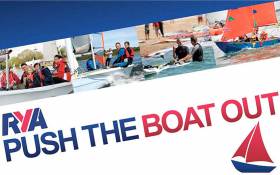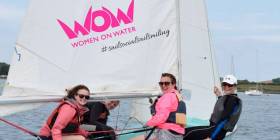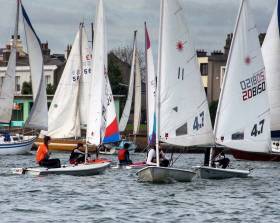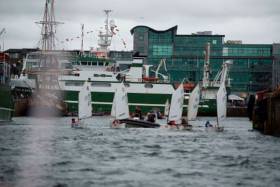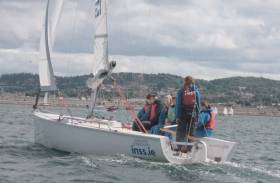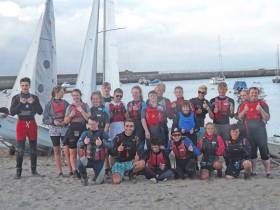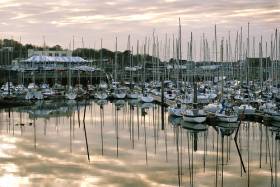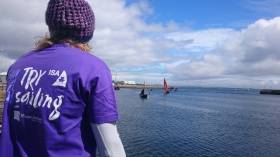Displaying items by tag: Try Sailing
Try Sailing And More At INSS Open Day This Sunday
The Irish National Sailing & Powerboat School is hosting its annual Open Day this Sunday 5 May with opportunities to try sailing, kayaking or paddleboarding for only €10.
Children aged 7 and up and their families can get to grips with the INSS’ fleet of 1720 Sportboats, as well as easy-to-master sit-on-yop kayaks and popular stand-up paddleboards, guided by the school’s experienced instructors.
Waterproof overalls and lifejackets will be provided for sailors, wetsuits and buoyancy aids for kayakers and paddleboarders, and hot showers will be provided after your fun on the water — so all you need to bring is your enthusiasm!
Three times slots are available on the day (10am-12pm, 12.30pm-2.30pm and 3pm-5pm) and booking must be made in advance. For more details see the INSS website HERE.
People in Northern Ireland are invited to ‘Push The Boat Out’ and try sailing or windsurfing for free or low cost across the region this May.
Around 20 venues across NI are hosting Push The Boat Out (PTBO) open days and taster sessions throughout the month.
Getting active outdoors has been shown to positively impact physical and mental health.
“An escape from modern-day life, getting out on the water is something the whole family can benefit from,” says the RYA Northern Ireland.
It highlights the “freedom of being afloat, the challenge and achievement of learning a new skill and the many new friends you will meet” among its attractions.
“Meanwhile, youngsters can develop heaps of positive life skills, like confidence, independence and teamwork, which they will take into all other areas of their lives.”
RYANI active clubs co-ordinator Lisa McCaffrey said: “We are delighted that for the second year running, Push The Boat Out will be returning for the whole of May.
“This is an exciting initiative where people right across Northern Ireland are being given a unique opportunity to visit many clubs and centres to give sailing a go.
“There are so many benefits to getting out on the water and it can really help to improve both our physical and mental health.
“If you’re interested in trying something completely different with your family, a workout in the fresh air or perhaps to get back out on the water after having a break then pop down to your local sailing club or centre during May.”
Push The Boat Out is a national campaign by the RYA which aims to make the water more accessible, whatever your age, background or ability — getting more people sailing, windsurfing, having fun and getting active outdoors.
All kit and safety equipment is provided, so just bring a pair of old trainers you don’t mind getting wet “and your sense of fun”.
Refreshments will be also be available at many venues, with a host of shore-side activities and entertainment to enjoy too.
Last year more than 39,000 people across the UK attended a PTBO open day, inspiring thousands of new sailors to join their local club.
RYANI Launches ‘Women On Water’ Programme For 2019
Marking International Women’s Day last Friday (8 March), RYANI launched its popular Women on Water programme for 2019.
The initiative, which sees women of all abilities take to the water, is being run in conjunction with a number of sailing clubs right across Northern Ireland.
Women taking part in the four-week programme will learn the basic skills of sailing, as well as meeting many new friends along the way.
RYANI’s active clubs co-ordinator Lisa McCaffrey said: “We have now been running the Women on Water programme for four years and it continues to grow from strength to strength.
“Sailing is a fun-filled sport but as our past participants have learned, there are many other health benefits. It is a fantastic stress-buster, helps us to keep fit and is a great way to learn some new skills.
“The programme is open to all – you don’t need to be a member of a club already and you don’t need to have any sailing experience. This is a chance to get out on the water and have some fun.”
Any NI women interested in finding out more can complete this expression of interest form online.
Try Sailing At Howth Yacht Club’s Open Day Next Monday
#HYC - The doors of Howth Yacht Club will be open next Monday 22 October to anyone curious to try sailing or boating in North Co Dublin.
HYC will be one of many clubs across Ireland holding open days to show off what they do as part of Join A Club Week with the Ray D’Arcy Show on RTÉ Radio 1.
The clubhouse at Howth Harbour’s Middle Pier will be open to all from 10am on Monday, and HYC looks forward to seeing you there.
Clontarf Yacht and Boat Club will host its fourth annual Sail Against Suicide event on Saturday 25 August from 10am to 4pm.
Sail Against Suicide event is an initiative from Jessica Clohisey, one of the junior members of the club on Dublin’s Northside, who wanted to share her love of sailing while raising awareness about suicide.
“Clontarf Yacht & Boat Club is a community based, volunteer run club and we are keen to provide constructive support to the wider community,” said Commodore Andrew Semple.
“Mental health and the challenges around the issue are very really important and this event does a lot to provide information and raise awareness.”
Semple emphasised that Sail Against Suicide “is not a fundraising event – its purpose is simply to raise awareness of mental health issues that affect every community in Ireland and bring the topic into focus.”
This year’s day is also a Try Sailing event, part of the programme launched by Irish Sailing to encourage more people to take up sailing and other watersports.
“Participants can just turn up and we will get them out sailing all for free,” Semple said. “Clontarf Yacht & Boat Club have combined Try Sailing with Sail Against Suicide as the mental health benefits of sailing are well documented and we want to encourage as many people as possible to the club to raise awareness and have some fun.
“This is a free fun event. We aim to get 150 people on the water and will welcome more watching from the promenade. There will be music, food, entertainment, information and, above all, awareness.”
The Try Sailing Event is open to all. For more information or to register to go out sailing, contact [email protected].
Sailability In Focus For Seafest 2018
#SeaFest - This year’s SeaFest in Galway is offering activities specifically for children with sensory issues as well as watersports sessions for children and adults with disabilities or impairments.
Irish Sailing and its team of volunteers from sailing clubs across Galway are offering fully inclusive access to Try Sailing sessions over the three days of Ireland’s national maritime festival.
“We want everyone to be able to experience the thrill of being out on the water, and SeaFest offers a fantastic opportunity for children and adults with disabilities or impairments to try sailing or kayaking in a safe and supported environment,” said Ciarán Murphy, Irish Sailing’s national inclusion and children’s officer.
“Sailing offers a sense of freedom like no other sport, and is a great healthy outdoor and social activity. We hope our budding sailors enjoy the experience and will join us again in Galway for the Watersports Inclusion Games at the end of August.”
Galway City Museum will be hosting five workshops specifically for children with sensory difficulties and their siblings.
Led by Áine Lawless of Macnas, children can create colourful fish and other sea-themed creatures to take home. Volunteers from Galway Autism Partnership will provide assistance during each of the workshops.
Aisling Colreavy, co-ordinator at Galway Autism Partnership, said: “We are delighted to be part of SeaFest this year, and have an activity especially for children on the autism spectrum, and their siblings.
“Peer support is invaluable to our members, as these activities are a great opportunity to make connections with families and individuals in similar situations is very important in terms and understanding.”
As previously reported on Afloat.ie, a purpose-built marquee dubbed The Atlantic Theatre will showcase talks from multi-award winning cameraman Doug Allan and screenings of the documentary Ireland’s Deep Atlantic and popular Irish animation Song of the Sea. The Atlantic Theatre will be fitted with Loop Hearing to assist the hearing impaired.
SeaFest 2018 will offer a weekend of seafaring fun for all ages, with thrilling performances from world-class flyboarders, live seafood cookery demonstrations, vessel tours, a Defence Forces display and a host of marine-themed workshops for kids.
Get On The Water With The INSS This September
#TrySailing - Summer 2017 may be all but over, but the Irish National Sailing & Powerboat School still has a number of courses running for all ages and skill levels going into the autumn.
For junior sailors, the weekly Saturday sailing course returns for the school term from 16 September with groups for those aged 7-10, 11-14 and over 15.
Meanwhile for adults, the Start Sailing yacht course for absolute beginners is booking for its remaining dates on 23-24 September and 7-8 October. There is also limited availability for the course this weekend on 2-3 September — call 01 284 4195 to book.
Dinghy beginners also have their own course, with dates on 9-10 and 23-24 September, but places are going fast.
For more advanced students, the Level 2 yacht course and Level 2 dinghy course are booking for their final weekend on 30 September to 1 October.
National Powerboat Certificate courses for beginners have bookings available from Dun Laoghaire on 2-3 and 23-24 September, and from Malahide on 16-17 September. Both have further dates available going into the autumn.
The next intermediate powerboat course runs on 16-17 September with two more weekends available in October and November.
Competent crew and day skipper courses using the RYA syllabus are running till the end of the year and beyond, with dates for the former still available from 26-30 October and in the latter from 3 November.
Details of further courses, including the shore-based VHF radio course, sea survival and first aid, are available on the INSS website HERE.
Bray Lakers Take To The Sea In ‘Try Sailing’ Initiative
#TrySailing - Bray Sailing Club partnered last week with Lakers, a sport and recreation club for children and adults with an intellectual disability, to offer an introductory ‘Try Sailing’ course to seven Lakers members.
The sailability programme took place over three evenings, starting with a land-based familiarisation session on the first day, during which the newcomers to sailing learned how to rig and sit in a dinghy.
On the second evening, the group took to the water and experienced their first taste of the thrill of sailing inside the confines of Bray Harbour while the cruiser fleet raced with 25+ knots of wind outside. This session was followed by capsize drills near the beach in the harbour.
On the third evening, the dinghy fleet left the harbour and the trainees had a chance to helm their own boat, before heading into the clubhouse for a barbecue and the presentation of Irish Sailing’s Taste of Sailing certificates, including Irish Sailing’s first ever braille sailing certificate.
Speaking after the event, Lakers services manager Anthony Finnegan said: “We really appreciate the contribution of the amazing instructors and assistants in Bray SC in giving our members the opportunity to try sailing for the first time.
“The enthusiasm and excitement evident around the harbour was great to see, and we hope that some of our members will have the opportunity to participate in sailing on a regular basis in the future.”
Bray SC senior instructor Jack Hannon added: “I’m grateful to our team of instructors and assistants who gave of their time so willingly to make this partnership such a success.
“Sailing really is a sport for all, and our members were delighted to have the opportunity to share their passion for sailing with seven newcomers to the sport this week.”
Howth Plans Sailing School To Grow Yacht Club Into The Future
#HYC - A new sailing school for North Dublin Bay is part of plans to secure the future of Howth Yacht Club.
Commodore Joe McPeake laid out the club’s intentions in a statement on the HYC website in mid July, in which he announced a workshop would be held at the end of September for members to help shape its future.
Envisaged to be up and running as soon as March next year, the school plan aims to attract the “huge number of people now living in Dublin from outside Ireland, and working in the IFSC and other multinational areas” to get involved in sailing.
“It is vital that we attract these people, for if we don’t, we can quite sure that other clubs and sports will,” wrote McPeake.
Increasing members is a “paramount” goal for the club, with the commodore admitting that methods to drive the current turnaround in finances, by cost-cutting and raising subscriptions, are “not sustainable in the long term”.
Youth sailing is particularly underrepresented at Howth, he added. Despite a near full capacity in its summer sailing courses, McPeake said there as been a “marked reduction” in juniors involved in club racing, though this is part of a pattern across many other clubs.
“New forms of sailing must be developed to enthuse those who want to have fun in their own way, and sailing for juniors must be reinvented as it is competing against many other summer sports,” he wrote.
It’s hoped that solutions can be found to match the performance of the marina, where visitor numbers are up 20% on last year; the success of Howth crews in the ICRA Nationals, Volvo Dun Laoghaire Regatta and elsewhere; and the rude health of Howth’s dinghies and keelboats like the Puppeteer 22s and the homegrown Howth 17 class.
Irish Sailing Shares The Love At SeaFest 2017
#TrySailing - Galway skippers, scouts, clubs and centres volunteered their time during SeaFest 2017 to give 555 children and adults a Try Sailing experience on Galway Bay.
Over 100 volunteers represented the likes of Galway Bay Tours, Galway Bay Sailing Club, Galway City Sailing Club, Galway Sea Scouts, Clifden Boat Club, Spiddal Sailing Club and na Badoiri na Claddagh.
Together they combined boats and manpower to give some of the 100,000-plus SeaFest visitors a chance to sail or motorboat, experience the power and history of the Galway Hooker, and in general share their love of sailing and the sea.
Try Sailing at SeaFest, in association with the Marine Institute, was part of Irish Sailing’s nationwide initiative to get more people involved in the sport without big money, a club membership or even needing to own a boat.
Try Sailing opportunities like crewing, training, open days, starter sessions and more are held throughout the year across the country. Visit www.trysailing.ie to find what’s closest to you.


























